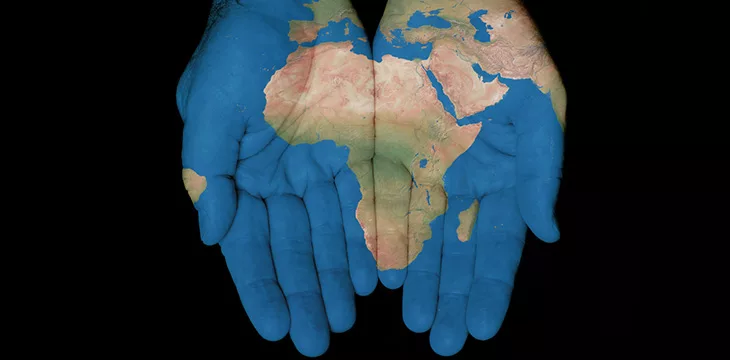|
Getting your Trinity Audio player ready...
|
While digital asset prices took a massive hit in 2022, blockchain adoption was on the rise as the world continues to distinguish between real utility and short-lived price speculation. Nowhere is this distinction clearer than in Africa, where blockchain continues to make a real impact in the day-to-day lives of millions of underserved, marginalized, and underbanked residents.
429% spike in blockchain funding for African startups
A recent report by blockchain VC fund CVVC highlighted Africa’s continued appetite for blockchain and how it’s attracting interest from global financiers. The report revealed that African blockchain startups saw a 429% increase in funding in 2022, the highest growth globally. Asia came in at a distant second at a 50% increase, while Europe recorded a 35% increase.
Seychelles and South Africa led the region in funding raised, while Nigeria ranked at the top for the number of deals. KuCoin, the global exchange, and Scroll.io, an Ethereum Layer-2 scaling solution, both based in Seychelles, became Africa’s first blockchain unicorns in 2022 with massive fundraising rounds.
Beyond the cheques, the report highlighted how blockchain changes lives for millions across the region. Take Sun Exchange, a South African peer-to-peer solar panel leasing company that allows anyone to own and lease power cells to businesses.
With a billion people, Sub-Saharan Africa’s population is one of the world’s fastest-growing. However, according to the International Energy Agency, only half the population has access to electricity. Sun Exchange’s blockchain-based platform, which relies on digital assets for payments, allows users to invest as little as $5 to power solar panels that provide energy to South African schools, businesses, and organizations.
Access to healthcare and medical information remains a major challenge in Africa. Kenyan startup Afya Rekod uses blockchain to change this sector, allowing users to securely store their health information and interact with medical professionals.
Financial access is one of the industries most impacted by blockchain technology globally, and Africa’s no different. Startups like Ejara are democratizing access to financial services through blockchain technology. The Cameroonian startup offers digital asset savings products, stablecoin cross-border transfers, tokenized government bonds, and more.
It goes beyond the startups. Multinational institutions, non-government organizations, and even government agencies are warming up to blockchain in the region. In Kenya, the National Transport Safety Authority (NTSA) runs a blockchain service to alert the government about critical motor vehicle information.
Nigeria’s Union of Road Transport Workers (NURTW) is running its own blockchain service to increase road safety and reduce the costs and time associated with record-keeping.
There are challenges to the region’s rise as a blockchain hub. Regulations, or a lack of it, continue to be the biggest stumbling block. Blockchain companies operate under an ambiguous and vague legal framework that continues to keep away investors and users, especially at an institutional level.
South Africa, Kenya, and Zambia are among a handful of nations stepping up to regulate the sector. However, even with these trailblazers, the focus has been on digital assets. A few others have taken a crack at central bank digital currencies, led by Nigeria, whose eNaira debuted to underwhelming reception. No country has formulated concrete regulations aimed purely at fostering the adoption and growth of the technology.
Join African blockchain trailblazers at the London Blockchain Conference
Africa’s future could be shaped by blockchain technology, and this will be one of the key themes explored at this year’s London Blockchain Conference. The event will kick off on May 31 and will bring together some of Africa’s foremost blockchain developers, founders, innovators, and investors to discuss the way forward for the region.
The three-day event will explore beyond Africa’s blockchain rise, including global Bitcoin regulations, Web3 and the metaverse, NFTs, IPv6, tokenization, ESG, smart contracts, and much more.
CoinGeek Conversations with Gbemi Akande: Micropayments are a big deal in Africa

 07-03-2025
07-03-2025 





